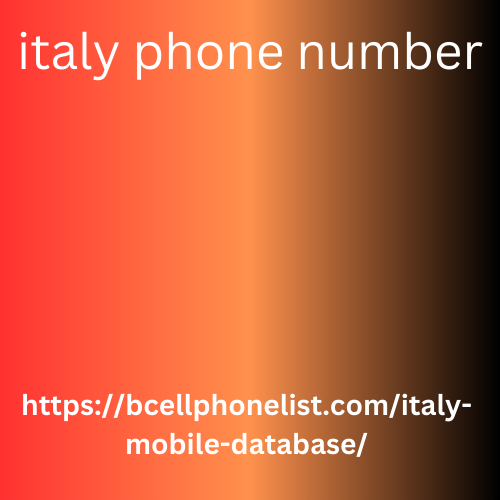Post by alimularefin63 on Jun 8, 2024 1:23:13 GMT -5
In the realm of international telecommunications, every country is assigned a unique country code to facilitate seamless communication across borders. The country code not only identifies the country a call is originating from or going to but also plays a crucial role in ensuring accurate routing and connection establishment. One such country code, essential for connecting with the Philippines, is +63. In this article, we delve into the significance of the +63 country code, its history, and how it impacts global communication.
Heading 2: The Origins and Evolution of the +63 Country Code
The +63 country code is assigned to the Philippines, a vibrant archipelago italy phone number located in Southeast Asia. The country code system was established by the International Telecommunication Union (ITU), the United Nations specialized agency responsible for information and communication technologies. The assignment of country codes like +63 dates back to the early days of international telephony when operators needed a standardized method to connect calls between different countries.
The Philippines was assigned the country code +63 in accordance with the ITU's guidelines. This assignment remains unchanged since its inception, providing consistency and reliability for callers dialing into or out of the Philippines.

Over the years, the telecommunications landscape in the Philippines has evolved significantly. From traditional landline networks to the widespread adoption of mobile phones and internet-based communication platforms, the country has embraced technological advancements to enhance connectivity both domestically and internationally. Despite these changes, the +63 country code remains a constant identifier, serving as a gateway for communication with the Philippines.
Heading 3: Navigating Communication with the +63 Country Code
For individuals and businesses seeking to communicate with contacts in the Philippines, understanding how to properly use the +63 country code is essential. Whether making international calls, sending text messages, or establishing video conferences, including the country code ensures that the communication is correctly routed to its destination.
When dialing a phone number in the Philippines from abroad, the caller must prefix the recipient's local number with the +63 country code. For example, if the local number is 123-4567, the international format would be +63 123-4567. Conversely, when dialing from within the Philippines to an international destination, the caller must prefix the international number with the appropriate exit code followed by the country code of the destination.
In addition to traditional voice calls, the +63 country code is also used for various other forms of communication, including SMS (Short Message Service) and MMS (Multimedia Messaging Service). When sending text messages or multimedia messages to contacts in the Philippines from abroad, including the +63 country code ensures that the messages are delivered without any issues.
Furthermore, with the proliferation of internet-based communication platforms such as VoIP (Voice over Internet Protocol) and instant messaging apps, connecting with contacts in the Philippines has become more convenient and cost-effective than ever before. Many of these platforms automatically handle country codes in the background, simplifying the process for users.
In conclusion, the +63 country code plays a vital role in facilitating communication with the Philippines, serving as a universal identifier for the country in the global telecommunications network. Whether making international calls, sending text messages, or using internet-based communication platforms, including the +63 country code ensures seamless connectivity with contacts in the Philippines. By understanding the importance of the +63 country code and how to navigate communication using this identifier, individuals and businesses can effectively stay connected with the vibrant and dynamic archipelago of the Philippines.

